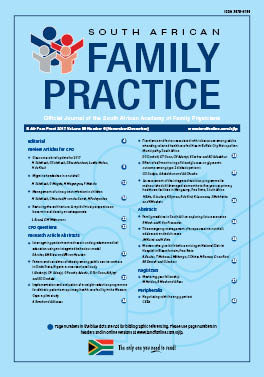An assessment of the integrated nutrition programme for malnourished children aged six months to five years at primary healthcare facilities in Mangaung, Free State, South Africa
Keywords:
children, Free State, malnutrition assessment, nutrition programme, South Africa, supplementary feeding
Abstract
Background: According to the World Health Organization (WHO), malnutrition can be linked to 45% of deaths in children under the age of five years. The Integrated Nutrition Programme (INP) was introduced in 1994 to address malnutrition in South Africa. There had been no systematic evaluation of how well clinics perform regarding nutritional services. Malnutrition rates worsened in the Free State from 3.9% in 2009 to 10.7% in 2013. This study aimed to assess the effectiveness of the INP Supplementary Feeding Programme in primary healthcare facilities in the Mangaung University of the Free State Community Partnership Project, known as MUCPP, catchment area of Bloemfontein, Free State, in children aged six months to five years. Methods: This was a retrospective, descriptive cohort study. All children between six months and five years entering the feeding scheme between July 2014 and June 2015 at the MUCPP, which is the hub of the feeding scheme, and three primary healthcare clinics were included. Data were collected from September to November 2015 from the INP registers and captured on dataextraction forms. Results: In total, 730 children were included in the study, 38.8% at risk for malnutrition and 61.2% malnourished. Most of the children (80.7%) stopped attending before change was seen. Only 14.1% exited the INP successfully with a normal weight for age and 3.0% deteriorated despite nutrition interventions. Of all children with one or more follow-up visits, 50.4% (119/236) improved from severe malnutrition to underweight or exited at target weight. Conclusions: The follow-up of the children and the monitoring and implementation of the INP are inadequate. There is some evidence that children who attend the INP regularly benefit from the programme. (Full text of the research articles are available online at www.medpharm.tandfonline.com/ojfp) S Afr Fam Pract 2017; DOI: 10.1080/20786190.2017.1340252
Section
Research Articles
By submitting manuscripts to SAFP, authors of original articles are assigning copyright to the South African Academy of Family Physicians. Copyright of review articles are assigned to the Publisher, Medpharm Publications (Pty) Ltd, unless otherwise specified. Authors may use their own work after publication without written permission, provided they acknowledge the original source. Individuals and academic institutions may freely copy and distribute articles published in SAFP for educational and research purposes without obtaining permission.

